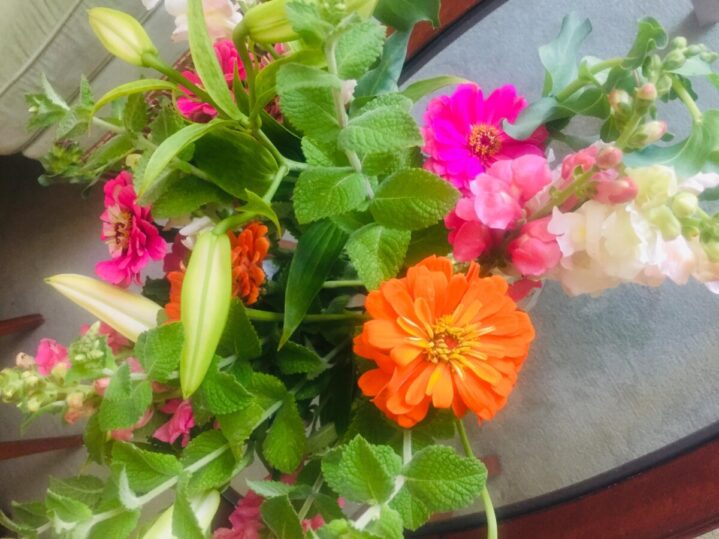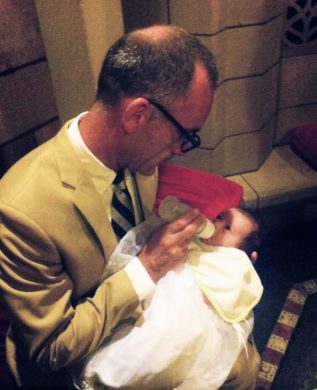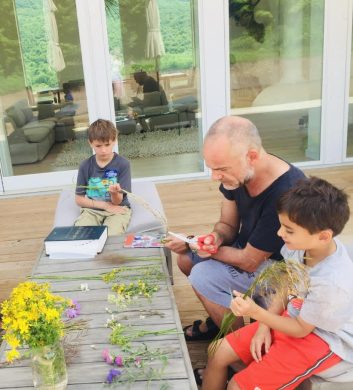
Far from home: Coping with loss and grief as an expat
Expat life is full of contradictions. Enviable on many fronts –Instagrammable holidays, eclectic cultural experiences, friends from around the world. Yet it is a life that can also be quite sheltered. One is buffered from home country problems and turmoil in ways that are positive and negative. Life in a foreign country fosters resilience to manage many life changes and challenges but also puts a strain on family relationships and friendships back home. Those in one camp can’t really understand or relate to the experience of those from the other camp. And only you, the expat, can straddle the difference. The expat, by default, cultivates the development of two distinct communities that truly never overlap – the “back home community” as in the people who really know you or think they do, and the “expat community” populated by unique, often fast-moving situational relationships. Most often, we as expats toggle between these communities with ease. It’s only when major life moments happen – a wedding, a birth, a death – that the longing for loved ones back home and the insufficiency of these disparate communities comes into focus. The sheen of expat life then loses a shade of lustre.
 The longer one lives abroad the more likely the possibility of dealing with the death of a loved one. It was here in my 10th year overseas when our family was faced with this. It happened over our summer holiday in the United States. A dear family friend, Bill, passed unexpectedly at the young age of 52. We were fortunate to be “back home” and to spend time with him in the days before he passed. A Friday night outing into the wee hours debating the merits of egg-white based cocktails and an ageing jazz band. A Saturday afternoon spent teaching my children card tricks and having the patience to listen to my daughter’s lengthy demonstration of her robotics project from summer camp followed by an early dinner. He appeared to be his normal healthy self, perhaps a bit tired and a touch of grey, as we all are. It was inconceivable that less than a week later, he would be dead. Far too soon. A bright star extinguished. We were in shock. Outraged and confused. We spent the remaining few days of our trip preparing to fly back home to Bangkok and grappling with the aftershocks. How did this happen? Why him? What next? Would the funeral take place before our flights back? What about having some time to distill and internalise the finality of it all with those we love before flying back to our expat community where our grief would be invisible.
The longer one lives abroad the more likely the possibility of dealing with the death of a loved one. It was here in my 10th year overseas when our family was faced with this. It happened over our summer holiday in the United States. A dear family friend, Bill, passed unexpectedly at the young age of 52. We were fortunate to be “back home” and to spend time with him in the days before he passed. A Friday night outing into the wee hours debating the merits of egg-white based cocktails and an ageing jazz band. A Saturday afternoon spent teaching my children card tricks and having the patience to listen to my daughter’s lengthy demonstration of her robotics project from summer camp followed by an early dinner. He appeared to be his normal healthy self, perhaps a bit tired and a touch of grey, as we all are. It was inconceivable that less than a week later, he would be dead. Far too soon. A bright star extinguished. We were in shock. Outraged and confused. We spent the remaining few days of our trip preparing to fly back home to Bangkok and grappling with the aftershocks. How did this happen? Why him? What next? Would the funeral take place before our flights back? What about having some time to distill and internalise the finality of it all with those we love before flying back to our expat community where our grief would be invisible.
Bill was the kind of friend who made everything beautiful. Incredibly creative, funny, and always finding a reason to smile, Bill was a close friend for 25 years. He was the friend who would whip up a tray of perfect mojitos in a flash at the summer beach house for “the six-ish” sunset cocktail hour. The one who would regale us for midnight runs for icebox cake at NYC’s West Village outpost of the famed Magnolia Bakery before that was a thing. The one who could always be counted on to give succinct, yet humorous, critiques on our fashion or home décor fails, then spend hours designing and restyling the most gorgeous outfit, home, garden, whatever. It would only be Bill to get everyone in the pool for hilarious “synchronised swimming drills” the night before my wedding. The one you could count on to gossip or vent with at any hour. Only Bill would drive the scenic, winding roads of New York’s Hudson Valley agreeing to deliver a dozen softly-chirping baby chicks, ill-advisedly and humorously Face Timing the entire experience. As much as I loved him, my children profoundly did too.
 He was creative, kind and, oh so, generous. A highlight of each summer trip back to the States was time spent with “Mr. Bill” and his annual surprise activity for them. He’d turn up, typically hours late, full of creative ideas and bags of treasures in hand. Coloured paper, stencils and frames for at home art projects. Garden walks, books and parchment paper for flower pressing tutorials. He’d arrive at our flat inevitably at some point with whimsical, life-sized, animal balloons for my children as “welcome home” pets knowing how much they missed their two dogs in Thailand. When he asked if my then 6-year-old daughter, God Daughter, had a Barbie doll and I answered not yet, it was classic Bill to turn up the next weekend with literally bags and bags full of Barbie dolls – Soccer Barbie, Mermaid Barbie, NASA Barbie, Sparkle Barbie, Pet Vet Barbie, Proudly Pink Barbie, Barbie Busy Gal, Travel Stacie and Dreamtopia Chelsea too. This along with an entire bag full of outfit changes and accessories too. That was Bill. He was exuberant. When he did something, he went big.
He was creative, kind and, oh so, generous. A highlight of each summer trip back to the States was time spent with “Mr. Bill” and his annual surprise activity for them. He’d turn up, typically hours late, full of creative ideas and bags of treasures in hand. Coloured paper, stencils and frames for at home art projects. Garden walks, books and parchment paper for flower pressing tutorials. He’d arrive at our flat inevitably at some point with whimsical, life-sized, animal balloons for my children as “welcome home” pets knowing how much they missed their two dogs in Thailand. When he asked if my then 6-year-old daughter, God Daughter, had a Barbie doll and I answered not yet, it was classic Bill to turn up the next weekend with literally bags and bags full of Barbie dolls – Soccer Barbie, Mermaid Barbie, NASA Barbie, Sparkle Barbie, Pet Vet Barbie, Proudly Pink Barbie, Barbie Busy Gal, Travel Stacie and Dreamtopia Chelsea too. This along with an entire bag full of outfit changes and accessories too. That was Bill. He was exuberant. When he did something, he went big.
That translated to his career and personal life evolution too. After more than two decades in product design and interiors for Gap Inc, Coach, and other major brands, he craved stillness and authenticity. His next and ultimately final chapter focused on interior design and restoring his beloved 1754 Hudson Valley farmhouse, that and gardening. Russian sage. Five different kinds of hydrangeas, five different types of lilacs. He learned the now-late artist Ellsworth Kelly’s property bordered him and he took this as inspiration to cultivate the ultimate country retreat. Once he remarked, half-worried, half-joking, if his garden was becoming “too Versailles for Columbia County?” That’s how he lived with enthusiasm, in the moment, in colour. With his devilish grin he encouraged us all to live. With exuberance. With joy.
 When confronted with a loss, expected or not, it does come as a shock to the system. Experts encourage us to accept and acknowledge the process of grieving without structure or a timetable. In 1969, psychiatrist Elisabeth Kubler-Ross M.D. proposed the now famous five stages of grieving which help represent what one goes through when dealing with terminal illness and death. She came to this after years of working with terminal cancer patients. These now famous stages detail the common phases people experience as they go through the grieving process.
When confronted with a loss, expected or not, it does come as a shock to the system. Experts encourage us to accept and acknowledge the process of grieving without structure or a timetable. In 1969, psychiatrist Elisabeth Kubler-Ross M.D. proposed the now famous five stages of grieving which help represent what one goes through when dealing with terminal illness and death. She came to this after years of working with terminal cancer patients. These now famous stages detail the common phases people experience as they go through the grieving process.
- Denial: This can’t be happening to me, my family, someone I love.
- Anger: Why is this happening? Who is to blame?
- Bargaining: If this goes away, I will do this in return.
- Depression: I’m too sad to do anything.
- Acceptance: I’m at peace with what happened.
What the five stages don’t directly take into account, and is uniquely tailored to expats is guilt. Guilt when we live half a world and multiple time zones away. Guilt that we can’t spend any – or enough – time with remaining loved ones to share, convalesce, laugh and cry together. We may even wonder, would things have turned out differently if we lived in our home country? Would we have noticed symptoms of an illness, encouraged proper care? Loss creates an emotional wound. Life as an expat lacks the normal rituals of grief. The expat is expected to just get on with life. Experts say we don’t get over grief, that time doesn’t so much as heal these wounds, but that we learn with time how to make peace with our loss.
I’m determined to hold onto the treasured memories, to remember the great times together. But what I can share is that Bill’s death gave new meaning to my own life. It’s when confronted with a death that we are starkly reminded of how precious life is.



